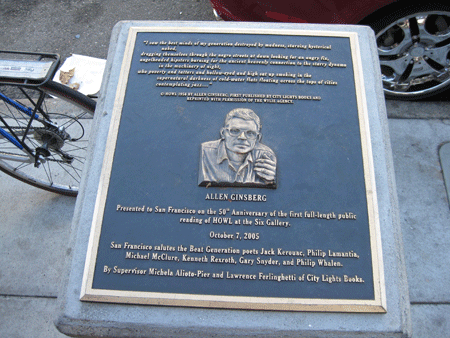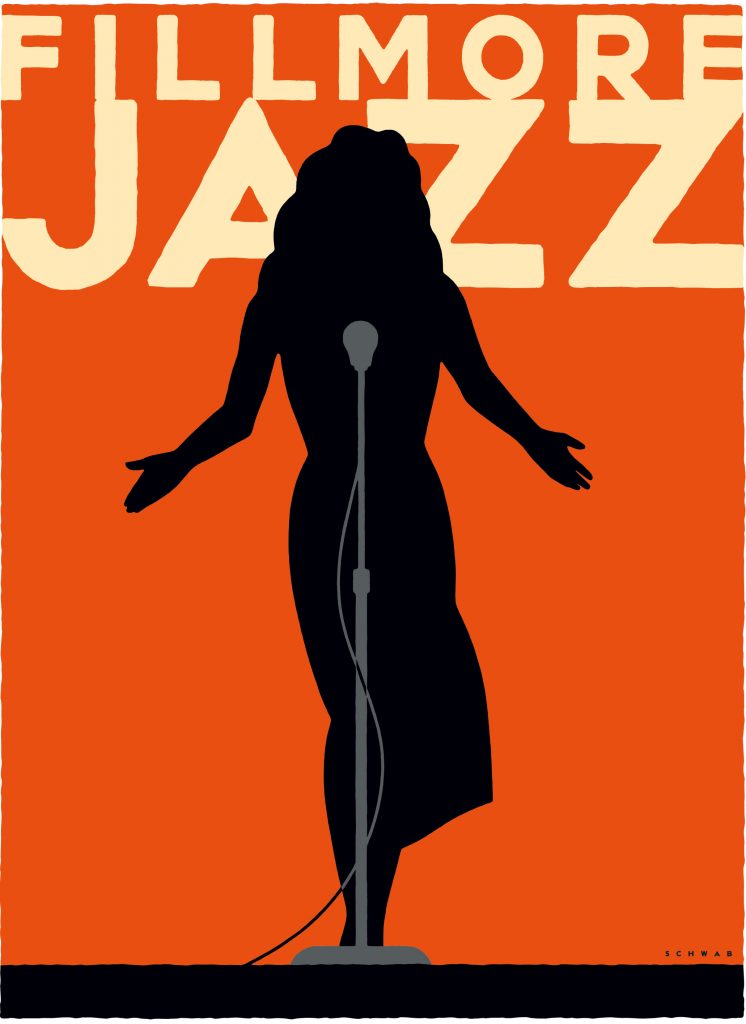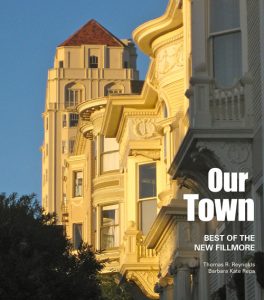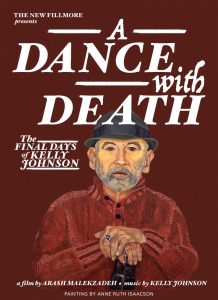
A sidewalk plaque at 3119 Fillmore commemorates the night the poem was first read.
The legendary poem “Howl” — which had its premiere on Fillmore Street in 1955 and is now the subject of a film showing at the Sundance Kabuki — was 29-year-old Allen Ginsberg’s first published work. But it instantly established him as a vital new voice for rapidly changing times.
It all began on what Jack Kerouac would come to call the “mad night” of October 7, 1955. That’s when Ginsberg read “Howl” for the first time at the soon-to-be-legendary Six Gallery — a former auto-body shop turned Bohemian hangout at 3119 Fillmore Street — and left the crowd of hipsters in tears.
Among those in the audience was City Lights publisher Lawrence Ferlinghetti, who was so exhilarated he sent a telegram to Ginsberg the next day offering to publish it. “’Howl’ knocked the sides out of things,” Ferlinghetti said later. That turned out to be true in more ways than one: Howl would soon become not just a game-changing literary sensation, but also an incendiary court battle.
On March 25, 1957, U.S. Customs seized all the copies of “Howl” en route to America from England, where the second edition had just been printed. Two months later, local police arrested Ferlinghetti, charging him with selling obscene material. Thus began the summer-long prosecution of The People v. Ferlinghetti. The high-profile trial that ensued — one that involved as many literature professors as lawyers and put the power of words itself on trial — would become a watershed freedom of speech case, opening the door to greater creative freedom.
Ginsberg went on to become one of the most highly regarded writers of the late 20th century, as well as an untiring champion of sexual and spiritual liberation, of human and civil rights, perennially battling with his trademark mischievousness to create a more open and engaged society.
“Howl,” however, took on a life of its own. More than a poem, it became many other things: a manifesto, a call to arms, a generational catharsis, a declaration of gay pride, a flashlight into the soul of post-industrial humanity, a love song and a lasting symbol of fearless creative rebellion.
Could “Howl” also be a movie? That question was put to filmmakers Rob Epstein and Jeffrey Friedman on the 50th anniversary of the poem’s publication by Bob Rosenthal, the secretary of Allen Ginsberg’s estate. What began as a conventional documentary soon evolved into a hybrid of drama, imagination and reality — much like Ginsberg’s writing.
“We’d been given this treasure, but now we were faced with, ‘How in the world do we actually do this?’” recalls Rob Epstein. “We set out to find a way to bring together all these different elements — the text of the poem, Ginsberg’s life and ideas, this landmark trial — to create a multi-faceted picture of the creation of “Howl” and the world’s response. The thrilling part was that we were inventing the form as we went along.”
On September 24, “Howl” the movie premiered — like the poem itself — on Fillmore. It continues at the Sundance Kabuki Cinemas at Fillmore and Post.
Filed under: Film, Neighborhood History




